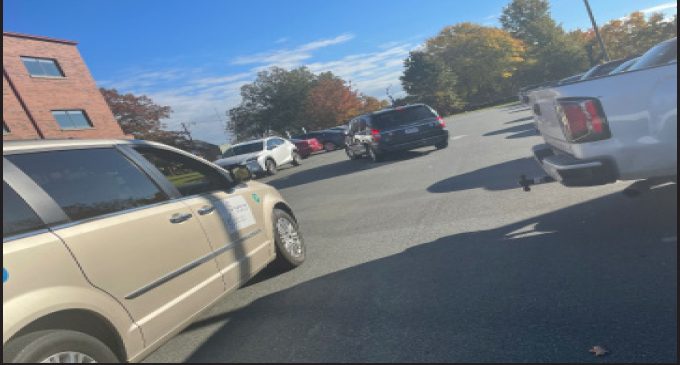We need more innovative transportation programs like this one
Support Systems vans leave their base at the Enterprise Center.

By John Railey
Three years ago, Courtney James and her husband, Gregory, drafted a plan for a business that would help fill the gap for workers who depend on the city’s inadequate bus system, the Winston-Salem Transit Authority (WSTA), to get to their jobs. Now their business is thriving, helping its patrons climb the ladder to upward economic mobility.
“Transportation is access to opportunity,” Courtney James said. “We have a large footprint in the city because we are a community business intent on meeting the needs of the people around us. Whether working with Community Court Services or transporting 50 young African American males to educational support services, we have our hands in just about anything that requires transportation, and it’s all to better our community and help individuals become more mobile.”
She and her husband started Support Systems of Forsyth County in 2019 with their savings and federal, state and local grants. They now have 10 vehicles and operate from the Enterprise Center, which is supported by Winston-Salem State University. Support Systems works 24/7 and averages about 85 trips per day throughout the county and to Greensboro. Clients include the elderly and disabled.
Weekly rates run just under $100. That is not cheap, but with gas prices, car maintenance, insurance, and taxes, commuting in your own car can cost more than twice that a month. Many Support Systems users lack driver’s licenses or the money to buy cars. Clients get their first two weeks of rides for free. Then, as many of those clients get settled in their work, they begin paying.
Innovative programs like this are sorely needed. WSSU’s Center for the Study of Economic Mobility (CSEM) has extensively studied WSTA and riders who use it to commute to work. Buses only run every hour, instead of every thirty minutes. Among CSEM’s research on the problem is a finding that riders who use the bus system to get to work spend an average of 12 hours a week commuting. That amounts to a time tax, CSEM Founding Director Craig Richardson has said, subtracting hours that riders could spend advancing at work or helping their children with homework.
CSEM contracted with local filmmaker Diana Greene to produce a 2018 documentary “Bus Stop Jobs” (2018) – YouTube, that has helped lead the debate on public transportation, as well as action, with The Winston-Salem Foundation setting up a round of grants of more than $200,000 for innovative programs on transportation reform. One of the grants funded a study that CSEM did with students at Forsyth Technical Community College, many of whom depend on WISTA.
CSEM has presented options for transportation reform to the public, most notably from the small city of Wilson, N.C., which has a ridesharing service that has replaced its bus system and is popular with its patrons. Richardson has asked why Winston-Salem can’t start a similar program on a hybrid basis.
The City of Winston-Salem has not taken such steps. The city did commission HDR, an Omaha-based company, to do a study of WSTA’s services. HDR, based on its recent presentation to the Winston-Salem City Council’s Public Works committee, will basically tweak WSTA’s existing plan, instead of exploring a hybrid ridesharing system and supporting and expanding businesses such as Support Systems of Forsyth County.
In an email to me, Courtney James wrote: “The future for us is electric, and we are working toward that. Cutting our fuel costs by going electric can open so many more doors and allow us to assist more individuals and organizations that rely on our services daily. We continue to seek innovative ways to ease the burden of not having adequate transportation. It’s going to take a working economy to restore what we lost from COVID.”
Three years on, her business is helping its patrons overcome transportation barriers. Her business is chipping away at the transportation problem as the city remains mired in piecemeal solutions.
John Railey, raileyjb@gmail.com, is the writer-in-residence for CSEM, www.wssu.edu/csem.











